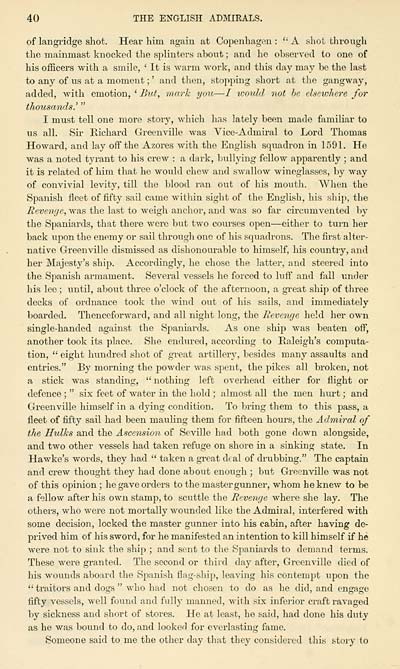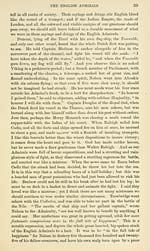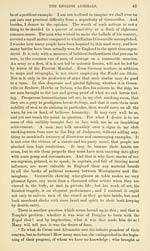Non-Fiction > Uncollected essays > Volumes 33-38, 1876-1878 - Cornhill magazine > Volume 38
(12) Page 40
Download files
Complete book:
Individual page:
Thumbnail gallery: Grid view | List view

40 THE ENGLISH ADMIRALS.
of langridge shot. Hear him again at Copenhagen : " A shot through
the mainmast knocked the splinters about ; and he observed to one of
his officers with a smile, ' It is warm work, and this day may be the last
to any of us at a moment ; ' and then, stopping short at the gangway,
added, with emotion, ' But, mark you — / would not be elsewhere for
thousands' "
I must tell one more story, which has lately been made familiar to
us all. Sir Eichard Greenville was Vice-Admiral to Lord Thomas
Howard, and lay off the Azores with the English squadron in 1591. He
was a noted tyrant to his crew : a dark, bullying fellow apparently ; and
it is related of him that he would chew and swallow wineglasses, by way
of convivial levity, till the blood ran out of his mouth. When the
Spanish fleet of fifty sail came within sight of the English, his ship, the
Revenge, was the last to weigh anchor, and was so far circumvented by
the Spaniards, that there were but two courses open — either to turn her
back upon the enemy or sail through one of his squadrons. The first alter-
native Greenville dismissed as dishonourable to himself, his country, and
her Majesty's ship. Accordingly, he chose the latter, and steered into
the Spanish armament. Several vessels he forced to luff and fall under
his lee ; until, about three o'clock of the afternoon, a great ship of three
decks of ordnance took the wind out of his sails, and immediately
boarded. Thenceforward, and all night long, the Revenge held her own
single-handed against the Spaniards. As one ship was beaten off,
another took its place. She endured, according to Raleigh's computa-
tion, " eight hundred shot of great artillery, besides many assaults and
entries." By morning the powder was spent, the pikes all broken, not
a stick was standing, "nothing left ovei'head either for flight or
defence ; " six feet of water in the hold ; almost all the men hurt ; and
Greenville himself in a dying condition. To bring them to this pass, a
fleet of fifty sail had been mauling them for fifteen hours, the Admiral of
the Hulks and the Ascension of Seville had both gone clown alongside,
and two other vessels had taken refuge on shore in a sinking state. In
Hawke's words, they had " taken a great deal of drubbing." The captain
and crew thought they had done about enough ; but Greenville was not
of this opinion ; he gave orders to the master gunner, whom he knew to be
a fellow after his own stamp, to scuttle the Revenge where she lay. The
others, who were not mortally wounded like the Admiral, interfered with
some decision, locked the master gunner into his cabin, after having de-
prived him of his sword, for he manifested an intention to kill himself if he
were not to sink the ship ; and sent to the Spaniards to demand terms.
These were granted. The second or third day after, Greenville died of
his wounds aboard the Spanish flag-ship, leaving his contempt upon the
" traitors and dogs " who had not chosen to do as he did, and engage
fifty vessels, well found and fully manned, with six inferior craft ravaged
by sickness and short of stores. He at least, he said, had done his duty
as he was bound to do, and looked for everlasting fame.
Someone said to me the other day that they considered this story to
of langridge shot. Hear him again at Copenhagen : " A shot through
the mainmast knocked the splinters about ; and he observed to one of
his officers with a smile, ' It is warm work, and this day may be the last
to any of us at a moment ; ' and then, stopping short at the gangway,
added, with emotion, ' But, mark you — / would not be elsewhere for
thousands' "
I must tell one more story, which has lately been made familiar to
us all. Sir Eichard Greenville was Vice-Admiral to Lord Thomas
Howard, and lay off the Azores with the English squadron in 1591. He
was a noted tyrant to his crew : a dark, bullying fellow apparently ; and
it is related of him that he would chew and swallow wineglasses, by way
of convivial levity, till the blood ran out of his mouth. When the
Spanish fleet of fifty sail came within sight of the English, his ship, the
Revenge, was the last to weigh anchor, and was so far circumvented by
the Spaniards, that there were but two courses open — either to turn her
back upon the enemy or sail through one of his squadrons. The first alter-
native Greenville dismissed as dishonourable to himself, his country, and
her Majesty's ship. Accordingly, he chose the latter, and steered into
the Spanish armament. Several vessels he forced to luff and fall under
his lee ; until, about three o'clock of the afternoon, a great ship of three
decks of ordnance took the wind out of his sails, and immediately
boarded. Thenceforward, and all night long, the Revenge held her own
single-handed against the Spaniards. As one ship was beaten off,
another took its place. She endured, according to Raleigh's computa-
tion, " eight hundred shot of great artillery, besides many assaults and
entries." By morning the powder was spent, the pikes all broken, not
a stick was standing, "nothing left ovei'head either for flight or
defence ; " six feet of water in the hold ; almost all the men hurt ; and
Greenville himself in a dying condition. To bring them to this pass, a
fleet of fifty sail had been mauling them for fifteen hours, the Admiral of
the Hulks and the Ascension of Seville had both gone clown alongside,
and two other vessels had taken refuge on shore in a sinking state. In
Hawke's words, they had " taken a great deal of drubbing." The captain
and crew thought they had done about enough ; but Greenville was not
of this opinion ; he gave orders to the master gunner, whom he knew to be
a fellow after his own stamp, to scuttle the Revenge where she lay. The
others, who were not mortally wounded like the Admiral, interfered with
some decision, locked the master gunner into his cabin, after having de-
prived him of his sword, for he manifested an intention to kill himself if he
were not to sink the ship ; and sent to the Spaniards to demand terms.
These were granted. The second or third day after, Greenville died of
his wounds aboard the Spanish flag-ship, leaving his contempt upon the
" traitors and dogs " who had not chosen to do as he did, and engage
fifty vessels, well found and fully manned, with six inferior craft ravaged
by sickness and short of stores. He at least, he said, had done his duty
as he was bound to do, and looked for everlasting fame.
Someone said to me the other day that they considered this story to
Set display mode to: Large image | Transcription
Images and transcriptions on this page, including medium image downloads, may be used under the Creative Commons Attribution 4.0 International Licence unless otherwise stated. ![]()
| Early editions of Robert Louis Stevenson > Non-Fiction > Uncollected essays > Cornhill magazine > Volume 38 > (12) Page 40 |
|---|
| Permanent URL | https://digital.nls.uk/78694498 |
|---|
| Dates / events: |
1878 [Date/event in text] |
|---|---|
| Subject / content: |
Volumes (documents by form) |
| Person / organisation: |
Stevenson, Robert Louis, 1850-1894 [Contributor] |
| Form / genre: |
Written and printed matter > Periodicals |
|---|---|
| Dates / events: |
1860-1975 [Date published] |
| Places: |
Europe >
United Kingdom >
England >
Greater London >
London
(inhabited place) [Place published] |
| Subject / content: |
Fiction Journals (periodicals) Short stories |
| Person / organisation: |
Smith, Elder, and Co. [Publisher] |
| Description | Essays and reviews from contemporary magazines and journals (some of which are republished in the collections). 'Will o' the Mill', from Volume 37 of the 'Cornhill Magazine', is a short story or fable. |
|---|
| Person / organisation: |
Stevenson, Robert Louis, 1850-1894 [Author] |
|---|



